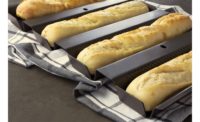Snack Food & Wholesale Bakery was recently able to chat with Josh Allen, founder, Companion Baking, St. Louis, MO, on filling the niche of supplying high-quality artisan bread in the grocery world.
Liz Parker: How have you seen the demand for artisan bread options, as well as “take and bake” and frozen bread, grow in grocery stores?
Josh Allen: The pandemic has created a lot of competing forces in the bakery department. We’ve seen fresh and DSD artisan bread sales dip slightly during the pandemic despite the overall volume increases for grocery. Shopping patterns changed pretty dramatically, and fresh bread sales were hurt by the reduction in frequency relative to trips to the store. Baguettes, for instance, are generally an impulse grab as customers peruse items in the bakery. With a lot less visits to the store, we saw volume reductions. We did see increases to Take and Bake products and longer shelf-life items like sliced Sandwich Breads, Focaccia, and Buns. Additionally, we saw strong transition to thaw and sell in the departments, even in the artisan bread category as labor challenges for the stores escalated.
LP: How does Companion work with grocery clients to develop a program to meet their customer needs?
JA: We work closely with the bakery category manager to curate a selection of breads that generally includes the popular artisan breads, seasonal varieties, and specialty loaves. Some store formats are looking to hit particular retail price points, some are searching for smaller package sizes, and some are interested in private label. Every situation is unique. Because we’re smaller and more nimble than many other bakers, we can work directly with the retailer to develop what they need or want including hands-on in-store education and training plus marketing and merchandising support.
LP: How have you leveraged your grocery relationships to provide awareness and support for Companion’s ongoing partnerships, such as your partnership with No Kid Hungry?
JA: We truly have some amazing customers. And we view our relationship as more than simply being their baker. We take great pride in supporting their initiatives and we are repaid in kind by them supporting ours. Our customers willingly give us a platform in which we can communicate our charitable endeavors.
LP: How have you created a deep understanding of the local market and selling product at a price that “makes sense”?
JA: We are committed to making craft breads that are approachable, affordable, and accessible. We understand that building a sustainable relationship with our consumers means they need to understand what we do, that our baked goods are sold at a fair price and that they are available to them when and where they want to purchase. If one of the legs on that stool breaks, the whole model falls apart. We work closely with retailers to understand crust and crumb preferences in their local market and have developed products specifically by brand or by region to address a variety of tastes. And in a number of instances, we’ve taken on production of key products for retailers in order to alleviate their own in-store or commissary production issues or bottlenecks while still allowing them to offer unique items for their customers.
LP: How, and why, has the market shifted towards frozen offerings to allow each grocery to sell “freshly baked bread”?
JA: Labor continues to be one of the industry’s major challenges. It is hard for everyone to find experienced bakers. Par-baked breads and, ultimately, thaw and sell breads, allow the store to offer high quality products without the obstacles of scratch production.
LP: What are the various challenges associated with making this shift, on the supplier side?
JA: Distribution is the biggest hurdle, especially in the midst of the pandemic. Supply chain problems, including driver shortages and fuel pricing, persist. We recognize that simply making great breads is not enough; we’ve got to work closely with our distributors and our grocers to ensure the products make it through the supply chain and to their back door. Logistics play as big of a role in bakery manufacturing these days as mixing and make-up. Our team possesses a wealth of experience in broadline distribution, and we leverage that knowledge to best take care of our customers.







.jpg?height=200&t=1628698413&width=200)

